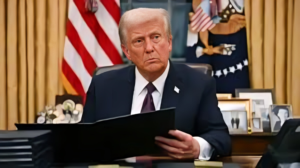U.S. State Department to Cut Over 1,350 Jobs in Major 2025 Shake‑Up
Introduction
In a surprising move announced on July 11, 2025, the U.S. State Department revealed plans to fire more than 1,350 employees as part of an extensive reorganization effort tied to the Trump administration’s policy shifts. This decision, aimed at streamlining diplomatic operations and reducing costs, has sparked debate across Washington, D.C., and beyond. While proponents argue it will make the Department leaner and more efficient, critics warn of potential damage to America’s global influence and morale among career diplomats.

Background of the Shake‑Up
Why the Cuts?
The State Department’s announcement follows months of internal review. Key drivers include:
- Budget Constraints
- Ongoing pressure from Congress to reduce federal spending.
- Desire to reallocate funds to defense and homeland security.
- Policy Realignment
- Emphasis on “America First” agenda, favoring bilateral over multilateral diplomacy.
- Shift toward digital diplomacy and reduced reliance on large embassy staffs.
- Operational Efficiency
- Plans to consolidate overlapping roles and eliminate redundant positions.
- Introduction of AI‑powered tools to handle routine consular and visa processing.
Scope of the Reductions
- Total Positions Affected: ~1,350
- Departments Most Impacted: Consular Affairs, Regional Bureaus, and Management Directorate
- Geographic Spread: Cuts to both Washington headquarters and select overseas missions.
Main Implications
Impact on Diplomacy
These reductions come with potential risks:
- Strained Bilateral Relations
Overseas embassies may face staffing shortages, delaying negotiations. - Consular Backlogs
Fewer officers could lengthen wait times for visas and U.S. citizen services abroad. - Loss of Institutional Knowledge
Cutting seasoned diplomats threatens to erode expertise built over decades.
“You can’t replace years of on‑the‑ground experience with an algorithm,” said one senior officer, speaking on condition of anonymity.
Employee Morale and Legal Challenges
- Town‑Hall Protests:
Affected employees staged protests in mid‑June, demanding transparency. - Union Involvement:
Foreign Service unions are weighing litigation under civil‑service protections. - Mental Health Concerns:
Uncertainty has led to increased reports of stress and burnout, according to internal surveys.
Cost Savings vs. Long‑Term Costs
While the Department projects saving $250 million annually, analysts warn of hidden costs:
- Re‑Recruitment Expenses: If diplomatic needs shift again, rehiring and retraining will be costly.
- Reputation Damage: Allies may view cuts as a sign of weakening U.S. commitment abroad.

Real‑Life Example: Visa Delays in Mumbai
Last month, the U.S. Consulate in Mumbai faced a backlog of 15,000 visa applicants. With staffing down by 20%, interview slots were pushed from two weeks to six weeks. One student, Priya Sharma, missed her orientation at a U.S. university because of the delay. “I waited and waited,” she recalls, “but no update came. It nearly cost me my scholarship.” This scenario highlights how resource cuts can ripple out, affecting individuals and bilateral goodwill.
Looking Ahead: What to Expect
- Further Automation
- Roll‑out of AI chatbots for visa inquiries.
- Digital credentialing to reduce paperwork.
- Outreach to Congress
- Department officials will seek buy‑in for supplemental funds if backlogs worsen.
- Possible amendments to whistle‑blower protections in the next spending bill.
- Monitoring by Watchdogs
- GAO and Inspector General reviews slated for late 2025.
- Public reports on cost‑benefit outcomes due Q1 2026.

Conclusion
The State Department’s decision to fire over 1,350 employees marks one of the most significant downsizing efforts in recent history. While the administration touts efficiency gains and cost savings, the move raises urgent questions about America’s diplomatic capacity and global leadership. As the changes take effect, stakeholders from career diplomats to visa applicants will be watching closely—highlighting that in diplomacy, human expertise often remains irreplaceable.